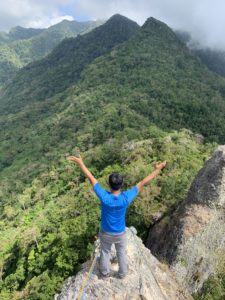A long and winding path to conservation
The province of Batangas, which stretches along the southern part of the Philippine island of Luzon, offers a plethora of options for the adventurous, nature-loving traveler. Hikers from across the country and beyond come to scale the Nalayag Monolith, a sharp peak that offers panoramic views of forest and ocean. The surrounding mountains and valleys support a dense forest watershed that drains into the Verde Island Passage, a waterway boasting some of the world’s highest marine biodiversity and a bucket-list destination for divers. (Seacology is organizing a visit to the Passage in December; learn more here.)

Our partnership with the municipality of Lobo helps protect this popular but sensitive island habitat, on both land and at sea. The community has long been committed to conservation, successfully organizing to stop a proposed mine in 2015. Our local partner organization, the ABS-CBN Foundation (AFI), backed that grassroots campaign. It has since worked with the community to support sustainable agriculture and ecotourism as an alternative to destructive exploitation of the land.
In 2018, AFI and SINAGAN, a newly formed association of community representatives, approached Seacology for help with an ecotourism initiative. They focused on the Mt. Nalayag trail, which winds through idyllic forests past streams and waterfalls before making its ascent up the monolith and other peaks. Enforcement against cutting trees had been falling behind, and the trail was in disrepair.
Seacology funded several improvements. A new solar-powered visitors’ center, which doubles as an office for SINAGAN and a training facility for rangers, was built near the trailhead, along with new restrooms. Our partners now help fund trail maintenance by selling snacks and supplies to hikers from the visitors’ center. Our grant also helped improve the trail itself. The old ladders and guardrails scaling the peaks had dangerously deteriorated and our grant helped the community replace them with more durable metal ones.
The old wooden stairway up the Nalayag monolith was deterioriating.
Seacology funded a stronger metal ladder to the peak as part of our project.
The project relieved pressure on both the forest and the Verde Island Passage by training community members, who had made a living by fishing and other extractive industries, to work as guides and rangers. To repair the damage from years of logging, our partners have planted thousands of native tree seedlings, grown in a new nursery, along the trail. They’ve even gotten visitors involved, giving them seedings and supervising the planting.
Hikers gather outside the new visitors' center
A coral reef in the Verde Island Passage. © Beth Watson/Ocean Image Bank
The project has faced several setbacks. Soon after its launch, two destructive typhoons struck the area in late 2019, bringing tourism to a standstill. Just weeks later, nearby Taal Volcano erupted, blanketing southern Luzon in ash and forcing thousands of people to evacuate. Finally, lockdowns resulting from the COVID-19 pandemic closed the trail for nearly two years. But with those crises receding into the past, the improved trail is now open for business.
As visitors return to the area, there’s a risk of loving such a beautiful place to death. Our partners carefully control use of the trail, limiting the number of daily hikers and closing the trail each Monday for maintenance and cleaning.

AFI was formerly led by the late Gina Lopez, a tireless environmental advocate, secretary of the country’s Department of Environment and Natural Resources, and recipient of the 2017 Seacology Prize for her opposition to destructive mining. Her sister, Roberta L. Feliciano, sees the successful completion of the Lobo project as a continuation of her mission to protect the Philippines environment and help struggling people there.
“I still remember seeing the video when Gina, my sister, personally received the reward from your organization in California,” Feliciano wrote. “Her passion and steadfast belief in ecotourism was palpable. Her desire to protect nature and empower community never failed to win over hearts and minds.”

